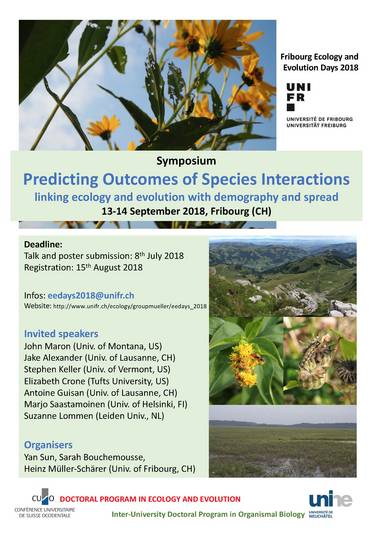Detailed information about the course
| Title | Predicting outcomes of biological interactions: linking ecology and evolution with demography and spread |
| Dates | 13-14 September 2018 |
| Organizer(s) | Prof. Heinz Müller-Schärer, University of Fribourg (CH) Dr. Sarah Bouchemousse, University of Fribourg (CH) Dr. Yan Sun, University of Fribourg (CH) |
| Speakers | John Maron (University of Montana, USA) Jake Alexander (University of Lausanne, Switzerland) Stephen Keller (University of Vermont, USA) Antoine Guisan (University of Lausanne, Switzerland) Elizabeth Crone (Tufts University, USA) Marjo Saastamoinen (University of Helsinki, Finland)
Summarizer: Tobias Züst (University of Bern, Switzerland) |
| Description | The factors that determine the rates of population increase or decline and the differential contributions from individuals are central to the demography and evolution in natural populations. Besides abiotic factors, such changes are driven by species interactions. Scaling up to predicting species distributions is an especially challenging task, as abiotic tolerances, dispersal capacity and biotic interactions each vary in time and space. The workshop will explore the most recent advances towards predicting the spread of species using a mechanistic approach. For this we will bring together knowledge on linking outcomes of ecological species interactions with demography and evolutionary dynamics and ranging from genomics to modelling tools to better understand and predict future spread of species. This becomes more complex when environments are changing, such as in the face of climate change or in novel environments in the case of biological invasions and biological control. Understanding such outcomes of species interactions is relevant both for basic science, but also for its application to pest species in agriculture, invasion biology and for conservation issues. We have invited a number of well-known experts that will each give a lecture of 45 min followed by a discussion with the students. Students will also have the opportunity to present their work in short talks and posters. We also plan round-table discussions in small groups, moderated by the experts, on focussed the workshop topics (approaches, controversies, theory).
|
| Location |
Fribourg |
| Credits | 1-1.5 |
| Evaluation | 1 ECTS: Full attendance and active participation 1.5 ECTS: Full attendance, active participation and presentation of your research |
| Information | OFFICIAL WEBSITE OF THE SYMPOSIUM
When? 13-14 September 2018
Where? University of Fribourg (CH)
Questions? Marta Bellone @: ecologie-evolution(at)cuso(dot)ch Phone: +41 (0)26 300 88 91 |
| Expenses | Reimbursement:PhD students of the DPEE are eligible for reimbursement of incurred travel expenses by train (half-fare card, and 2nd class). Please send the original tickets along with the reimbursement form to: Marta Bellone
NEW from 2018: NO reimbursement of your meal expenses
Regarding reimbursement of accomodation, please contact the coordinator of the doctoral program (ecologie-evolution(at)cuso.ch) BEFORE the beginning of the course. NO reimbursement of accomodation without the agreement in advance of the course of the coordinator of the doctoral program. |
| Registration | CUSO PhD students: through your MyCUSO account.
External participants (non-CUSO PhD students, post-docs, etc...): use the icon "registration" at top of page and the last gray box "non-CUSO student" ("personne hors myCUSO").
Deadline for registration September 2, 2018.
Registration fees: CUSO DPEE PhD Students: 25 fr Other CUSO members: 90 fr External participants (i.e. from a non-CUSO university): Please contact eedays2018(at)unifr(dot)ch before registering! |
| Places | 40 |
| Deadline for registration | 02.09.2018 |



